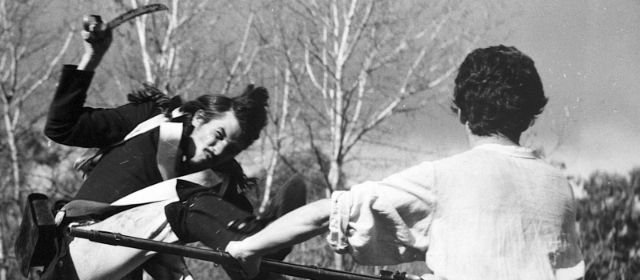A CAÇADA DO MALHADEIRO (1967, Quirino Simões)


[Quarto Perdido | Lost Room]
LUSITANA VINGANÇA.
O contexto político em que A CAÇADA DO MALHADEIRO foi produzido remete-nos, inevitavelmente, para uma leitura nacionalista do seu predicado. A história de um pai — viril, humilde e rural, em harmonia com a imagem masculina promovida pelo Estado Novo — que resgata, furiosamente, a honra da filha violada por três soldados de Napoleão é, também, a simbólica exaltação do ente português, em confronto directo com opressões e influências estrangeiras. O seu teor exploitation é ténue, a narrativa na vertigem do exíguo, mas importa salientar a redescoberta de um título, recentemente restaurado pela Cinemateca Portuguesa, merecedor de visualização e análise.
O contexto político em que A CAÇADA DO MALHADEIRO foi produzido remete-nos, inevitavelmente, para uma leitura nacionalista do seu predicado. A história de um pai — viril, humilde e rural, em harmonia com a imagem masculina promovida pelo Estado Novo — que resgata, furiosamente, a honra da filha violada por três soldados de Napoleão é, também, a simbólica exaltação do ente português, em confronto directo com opressões e influências estrangeiras. O seu teor exploitation é ténue, a narrativa na vertigem do exíguo, mas importa salientar a redescoberta de um título, recentemente restaurado pela Cinemateca Portuguesa, merecedor de visualização e análise.
LUSITANIAN REVENGE.
The political context in which A CAÇADA DO MALHADEIRO was produced brings us to an inevitable nationalist reading in its purposes. The story of a father – manly, humble and rural, just like the masculine portrait mustered by that era’s regime – that furiously redeems his daughter’s honour, raped by three Napoleonic soldiers, is also a symbolic exaltation of the Portuguese being, in direct confrontation against foreign oppression and impositions. There is a thin sense of exploitation, and the narrative almost non-existing, but it must be noted the rediscovery of a movie, newly restored by the Portuguese Cinematheque, that deserves proper reviewing.
The political context in which A CAÇADA DO MALHADEIRO was produced brings us to an inevitable nationalist reading in its purposes. The story of a father – manly, humble and rural, just like the masculine portrait mustered by that era’s regime – that furiously redeems his daughter’s honour, raped by three Napoleonic soldiers, is also a symbolic exaltation of the Portuguese being, in direct confrontation against foreign oppression and impositions. There is a thin sense of exploitation, and the narrative almost non-existing, but it must be noted the rediscovery of a movie, newly restored by the Portuguese Cinematheque, that deserves proper reviewing.

- . Ficha Técnica / Credits:
| Realização e Argumento / Directed and Written by | Quirino Simões | ||
| Fotografia / Cinematography by | Aurelio Rodrigues | ||
| Música / Music by | Duarte Costa | ||
| Elenco / Cast | Fernando Gusmão (José), Carmen Mendes (Ana), Rui Mendes (Joaquim), Mário Jacques (Robert), Baptista Fernandes (Fouet), Serge Farkas (Luc), Vítor Gomes (Antoine) | ||
| Ano / Year of release | 1967 | ||
| País / Country | Portugal |
Comentários
Enviar um comentário